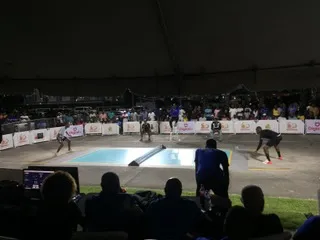
Does tennis seem inaccessible because you lack funds or access to a club? Then why not simply draw a 20x4 foot yellow rectangle on a flat surface by the side of a road, and use a 7-inch-tall slab of wood as a net? Next, make some medium-sized wooden rackets and remove the tennis ball’s felt covering. Game on! Now, all you need to do is work on your flexibility and your knees to hit the ball and play a real match that combines the rules of tennis and table tennis.
It was this proof of ingenuity that saw road tennis being created on the streets of Barbados around 1930. A time when tennis and cricket, imported by the British colonists, were reserved for the white elite. A homegrown sport, road tennis reflects the resilience, creativity and community spirit of Bajans*. Initially considered ‘the poor man's tennis’, this popular activity, accessible to all, has gradually established itself as a true sporting discipline, featuring national championships… and fervour. In fact, it was the colourful crowd lining the roadside at Dover Beach (a popular tourist beach on the south coast) that drew me to the Open Road Tennis tournament last week. The court, laid out on a small square, was illuminated with powerful floodlights thanks to a small electric generator. A referee was perched on a tall chair, with a few rows of chairs for spectators lucky enough to get them, while others stood around the court to get a better view.
On the court itself, play was very fast, at ground level, forcing the players to bounce constantly in a squatting position. The atmosphere was great, like a party, with adults, children, crisps, ice cream, drinks, applause, cheers and wails of disappointment all part of the scene. More than just a family sport, road tennis is a vibrant part of Bajans’ national identity and of Barbados' cultural heritage. In recent years, road tennis has become increasingly popular, with more and more courts being set up in communities and at the beach. This is thanks to a two-pronged government initiative designed to encourage physical activity as well as attract the attention of tourists and foreign media to take this national sport international.
Indeed, at a time when American pickleball, which first appeared in the 1960s, is enjoying dazzling success, why allow it to establish itself as an international sport at the expense of its Bajan ancestor?
*Bajan (pr. bay-djun): noun or adjective, derived from “Barbadian
Author : Jihane Sfeir
English translation by Joy Lewis (https://www.aaatranslationservicesbb.com/en/
